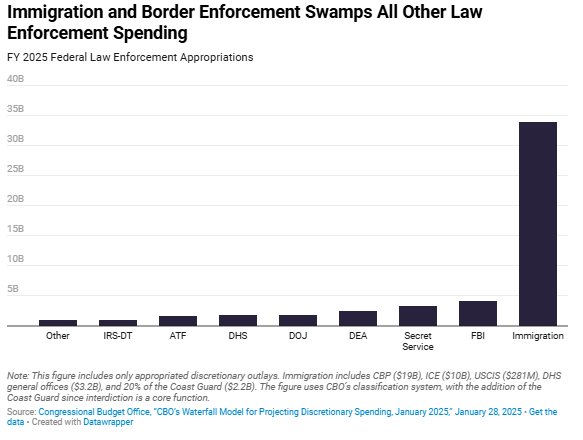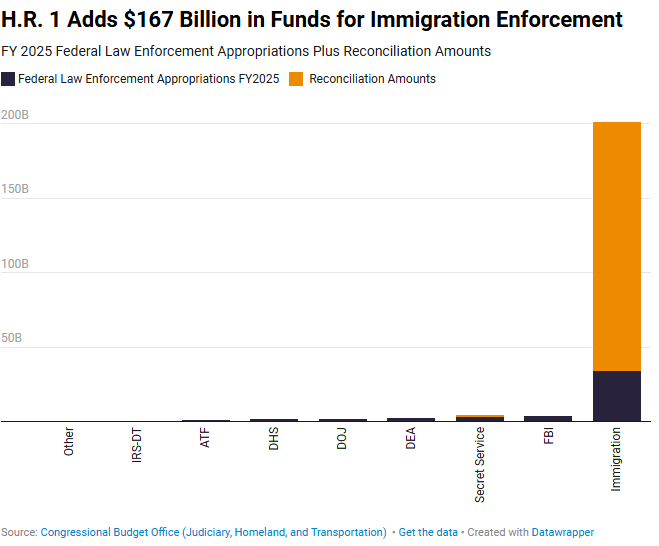Yet that’s exactly how the federal government allocates resources. The federal government spends far more on immigration enforcement than on preventing violent crime, terrorism, tax fraud or indeed all of these combined.

Moreover, if the BBB bill is passed the ratio will become even more extreme. (sere also here):

Don’t make the mistake of thinking that immigration enforcement is about going after murderers, rapists and robbers. It isn’t. Indeed, it’s the opposite. ICE’s “Operation At Large” for example has moved thousands of law enforcement personnel at Homeland Security, the FBI, DEA, and the U.S. Marshals away from investigating violent crime and towards immigration enforcement.
I’m not arguing against border enforcement or deporting illegal immigrants but rational people understand tradeoffs. Do we really want to spend billions to deport dishwashers from Oaxaca while rapes in Ohio committed by US citizens go under-investigated?
Almost half of the murders in the United States go unsolved (42.5% in 2023).
[ed. Also - this book:]
The greatest obstacle to sound economic policy is not entrenched special interests or rampant lobbying, but the popular misconceptions, irrational beliefs, and personal biases held by ordinary voters. This is economist Bryan Caplan's sobering assessment in this provocative and eye-opening book. Caplan argues that voters continually elect politicians who either share their biases or else pretend to, resulting in bad policies winning again and again by popular demand.
The greatest obstacle to sound economic policy is not entrenched special interests or rampant lobbying, but the popular misconceptions, irrational beliefs, and personal biases held by ordinary voters. This is economist Bryan Caplan's sobering assessment in this provocative and eye-opening book. Caplan argues that voters continually elect politicians who either share their biases or else pretend to, resulting in bad policies winning again and again by popular demand.
Boldly calling into question our most basic assumptions about American politics, Caplan contends that democracy fails precisely because it does what voters want. Through an analysis of Americans' voting behavior and opinions on a range of economic issues, he makes the convincing case that noneconomists suffer from four prevailing biases: they underestimate the wisdom of the market mechanism, distrust foreigners, undervalue the benefits of conserving labor, and pessimistically believe the economy is going from bad to worse. Caplan lays out several bold ways to make democratic government work better--for example, urging economic educators to focus on correcting popular misconceptions and recommending that democracies do less and let markets take up the slack.
The Myth of the Rational Voter takes an unflinching look at how people who vote under the influence of false beliefs ultimately end up with government that delivers lousy results.
-----
[ed. Finally, this irritating interview with a newly political tech bro: Fit to Rule (@jasmin):]
"Elon has left the Trump White House to pursue the full-time venture of Twitter canceling his former boss. Silicon Valley and MAGA conservatism were always an odd fit—tied more by who they hated than what they support.
"Elon has left the Trump White House to pursue the full-time venture of Twitter canceling his former boss. Silicon Valley and MAGA conservatism were always an odd fit—tied more by who they hated than what they support.
I’m still fascinated and befuddled by what drove so many founders and investors to support Trump in 2024. Most of these folks are not deep Republican partisans or racist caricatures; many are even intelligent, well-intentioned, and politically engaged—yet voted in a way I consider deeply and destructively wrong.
I trawled my group chats for someone willing to have a candid conversation. This person is a founder, immigrant, and Bernie-to-Trump supporter. Below, we discuss “country club Democrats,” why founders see themselves in Trump, and why he turned on the current administration.
Tell me about your background.
I’m a startup founder. I’m originally from Chile, and grew up across Chile, the US, and France.
How would you describe your political orientation?
Heterodox is one way to put it.
My parents are the children of wealthy, left-leaning intellectuals. I discovered Marxism around 14, and that really opened my eyes. The idea of human dignity really mattered to me. When you read stories of the US factories and the meat producers, it’s fucking nuts.
Bernie announced his candidacy in 2015, when I was finishing high school in the US. He was the first politician who really touched me. I would cry at Bernie speeches. His theory of economics felt so true, about a class being left behind. The 2016 election was very unexciting at first because the polls were all Jeb Bush vs. Hillary Clinton. It felt so trite and boring. Then Bernie announced, and I became a complete aficionado. I had a Bernie Instagram account. It was his authenticity.
My disillusionment with establishment Democrats started during that primary, because it felt rigged. You could see television actively lying about who Bernie was, using sound bites incorrectly, picking favorites. I never felt Hillary Clinton was elected. She was just appointed.
Anyway, Bernie loses. Trump is in the race at that point, and you get to the actual election. At that point, I'm basically a Trump supporter. I always think of politics as having a candidate of hope and a candidate of the status quo. I felt that Trump was the candidate of hope, weirdly enough.
Did going from Bernie to Trump feel like a dissonant thing to do?
No. It was like, fuck these people that stole the election from Bernie. They're not on our side. If you look at where Bernie versus Hillary stood in 2016, she was essentially a Republican in ways that were the worst of both worlds. She had the elitism of Democrats, and also all the bad neoliberal policies that Bernie fought against. The pitch was literally, "My name is Hillary Clinton." And it's like, "Says who?" Trump winning was the revenge of the Internet, in some ways.
Trump 1.0 was very much about immigration. You're an immigrant from Latin America. Was that weird?
No. I wasn't in the US for most of Trump 1.0, so it never came my way. I knew he delayed visas. I never took it as a big deal. My perception of Trump 1.0 was that the first year was really tumultuous, and the other three years were actually really good. (...)
Trump has this unpredictability, the willingness to do shit that maybe you shouldn't do. That worked with his foreign policy. He knows how to empire.
No. It was like, fuck these people that stole the election from Bernie. They're not on our side. If you look at where Bernie versus Hillary stood in 2016, she was essentially a Republican in ways that were the worst of both worlds. She had the elitism of Democrats, and also all the bad neoliberal policies that Bernie fought against. The pitch was literally, "My name is Hillary Clinton." And it's like, "Says who?" Trump winning was the revenge of the Internet, in some ways.
Trump 1.0 was very much about immigration. You're an immigrant from Latin America. Was that weird?
No. I wasn't in the US for most of Trump 1.0, so it never came my way. I knew he delayed visas. I never took it as a big deal. My perception of Trump 1.0 was that the first year was really tumultuous, and the other three years were actually really good. (...)
Trump has this unpredictability, the willingness to do shit that maybe you shouldn't do. That worked with his foreign policy. He knows how to empire.
